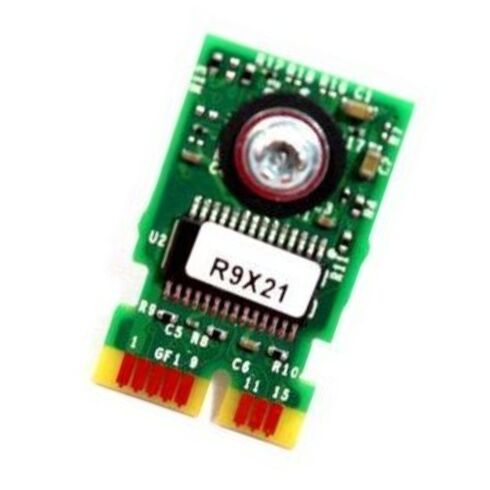R9X21 Dell Trusted Platform Module
- — Free Ground Shipping
- — Min. 6-month Replacement Warranty
- — Genuine/Authentic Products
- — Easy Return and Exchange
- — Different Payment Methods
- — Best Price
- — We Guarantee Price Matching
- — Tax-Exempt Facilities
- — 24/7 Live Chat, Phone Support
- — Visa, MasterCard, Discover, and Amex
- — JCB, Diners Club, UnionPay
- — PayPal, ACH/Bank Transfer (11% Off)
- — Apple Pay, Amazon Pay, Google Pay
- — Buy Now, Pay Later - Affirm, Afterpay
- — GOV/EDU/Institutions PO's Accepted
- — Invoices
- — Deliver Anywhere
- — Express Delivery in the USA and Worldwide
- — Ship to -APO -FPO
- — For USA - Free Ground Shipping
- — Worldwide - from $30
R9X21 Technical Overview
Key Details
- Brand: Dell
- Part Number: R9X21
Product Features
The R9X21 is an advanced product from Dell, offering cutting-edge features designed for optimal performance and reliability. Below are some of the core specifications:
Compatibility and Integration
- Engineered for seamless integration with various systems and setups
- Supports a wide range of applications, making it versatile for different environments
Connectivity Options
- Multiple connectivity options for smooth data transfer and network performance
- Designed to work with both modern and legacy systems
Performance Features
- Optimized for high-efficiency operations, ensuring minimal downtime
- Enhances overall system responsiveness for fast processing
Durability and Design
- Built with robust materials for extended longevity and reliability
- Compact design that fits into various environments without compromising functionality
Additional Specifications
Model Information
- Model: R9X21
- Manufacturer: Dell
Part Number Details
- Part Number: R9X21, identified for compatibility with specific setups and environments
Quality Assurance
Each unit undergoes rigorous testing to ensure high standards of performance, security, and durability.
Energy Efficiency
- Designed to minimize energy consumption while maintaining optimal functionality
- Meets industry standards for energy-saving protocols
Support and Warranty
- Backed by Dell’s trusted customer service and extended warranty options
- Access to a range of support materials, including manuals and troubleshooting guides
Dell R9X21 Trusted Platform Module: Enhancing Security and Data Protection
Introduction
In today's digital age, ensuring the security of sensitive data has become paramount. Organizations across industries are increasingly vulnerable to data breaches and cyberattacks. To combat these threats, Dell presents the R9X21 Trusted Platform Module (TPM), a cutting-edge solution designed to enhance security and protect valuable information.
What is a Trusted Platform Module (TPM)?
A Trusted Platform Module is a microchip that provides hardware-based security for computers, servers, and other devices. It securely stores encryption keys, passwords, and digital certificates, ensuring that sensitive data remains protected even if the device is compromised.
Key Features of the Dell R9X21 TPM
The Dell R9X21 TPM offers a wide array of features that make it an indispensable tool for organizations seeking to fortify their security measures. Some of the key features include:
1. Advanced Encryption Capabilities
The Dell R9X21 TPM supports advanced encryption algorithms such as RSA and ECC, ensuring robust protection for sensitive data. By offloading encryption operations to the TPM, system performance is enhanced while maintaining stringent security protocols.
2. Secure Boot Process
With the R9X21 TPM, organizations can ensure a secure boot process by verifying the integrity of the firmware and operating system during startup. This prevents unauthorized modifications or tampering, guaranteeing that only trusted software is executed.
3. Secure Storage of Credentials
Credentials such as passwords and encryption keys are securely stored within the TPM's protected memory space. This protects against unauthorized access and helps prevent credential theft or misuse.
4. Remote Attestation
The R9X21 TPM enables remote attestation, allowing organizations to verify the integrity of a device's configuration and software remotely. This feature is particularly valuable in cloud computing environments, ensuring that only trusted devices are granted access to sensitive resources.
5. Secure Device Identity
Each TPM has a unique identifier known as an Endorsement Key (EK), which provides a secure device identity. This identity can be used for authentication purposes, ensuring that only trusted devices are granted access to sensitive networks or services.
Benefits of the Dell R9X21 TPM
Implementing the Dell R9X21 TPM brings numerous benefits to organizations concerned about data security and protection. Some of the key advantages include:
1. Enhanced Data Protection
By leveraging the R9X21 TPM's advanced encryption capabilities, organizations can ensure that their sensitive data remains secure, even in the event of a security breach. The hardware-based encryption provided by the TPM offers a higher level of protection than software-based solutions.
2. Mitigation of Unauthorized Access
Storing credentials within the secure memory space of the TPM mitigates the risk of unauthorized access to sensitive information. This helps prevent data breaches resulting from stolen or compromised credentials.
3. Prevention of Tampering and Unauthorized Modifications
The secure boot process offered by the R9X21 TPM ensures that only trusted firmware and operating systems are executed during startup. This prevents tampering or unauthorized modifications, reducing the risk of malware attacks and maintaining system integrity.
4. Compliance with Industry Standards
Organizations operating in regulated industries often face strict compliance requirements related to data protection. By implementing the Dell R9X21 TPM, businesses can demonstrate adherence to industry standards and ensure they meet compliance obligations.
5. Simplified Remote Management
The remote attestation feature of the R9X21 TPM allows for simplified remote management of devices. Organizations can remotely verify the integrity of a device's configuration, ensuring compliance with security policies without the need for physical access to the device.



